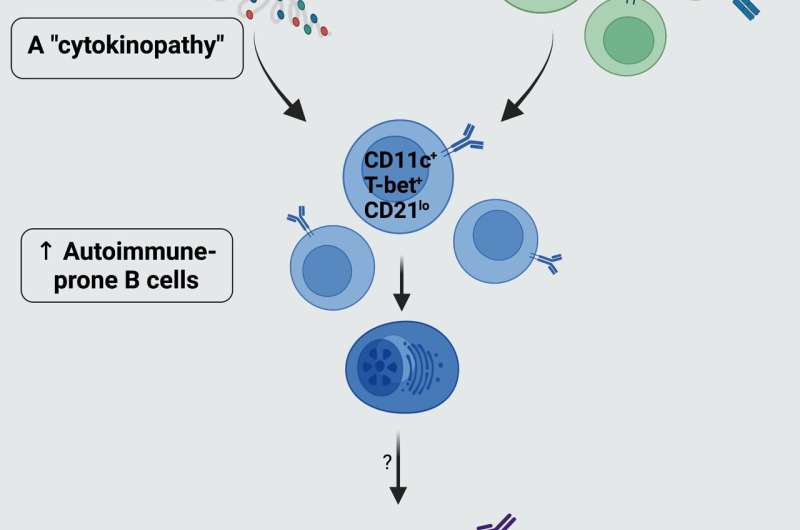Mechanisms underlying autoimmunity in Down syndrome revealed

Scientists at the Icahn School of Medicine at Mount Sinai in New York have identified which parts of the immune system go awry and contribute to autoimmune diseases in individuals with Down syndrome. The findings published in the February 22 online issue of Nature.
The work adds to the research team’s findings published in the journal Immunity in October 2022, showing that people with Down syndrome have less frequent but more severe viral infections.
Studying lab specimens from volunteers with Down syndrome, the investigators identified cytokines and a B cell subtype—key players in the adaptive immune response—as the potential culprits for most autoimmunity in people with the disorder.
Strikingly, the researchers found that many people with Down syndrome are in a perpetual state of inflammation comparable to those without Down syndrome who are in intensive care with an acute infection. According to the researchers, this leads to the breaking of immune tolerance, which results in autoimmunity.
“Our findings could be used to test existing therapies not commonly used in persons with Down syndrome and to develop potential therapeutics to alleviate autoimmunity symptoms in individuals with the disorder,” said Dusan Bogunovic, Ph.D., senior author of the study. “Available drugs such as tocilizumab and a variety of JAK inhibitors could potentially tame this inflammation. And in patients who have elevated autoimmune prone B cells, there is an opportunity to develop therapies targeting this cell type specifically.”
Dr. Bogunovic is a Professor at the Marc and Jennifer Lipschultz Precision Immunology Institute, and the Center for Inborn Errors of Immunity at Icahn Mount Sinai.
Down syndrome, the most common genetic condition diagnosed at birth, is typically caused by triplication of chromosome 21. Among other issues, people with Down syndrome suffer from autoimmunity, including hair loss, skin, gut, and thyroid problems. It is universally present across racial, gender, and socioeconomic lines in approximately 1 in 700 live births, although considerable variation exists worldwide.
“People with Down syndrome are an underserved population worldwide. They require the same level of dedication as all of us. We now have a better understanding of their health and are laying the groundwork to potentially use existing drugs and develop new ones, which could be transformative to their health,” said study first author Louise Malle, an MD/Ph.D. candidate at Icahn Mount Sinai. “We also need to keep in mind that, just like in the general population, not all individuals with the disorder are the same, and there is significant variability.”
Next, the researchers plan to dive deeper into the causes of autoimmunity in Down syndrome and to help propel a formal randomized placebo-controlled clinical trial in which available drugs could best be tested in the clinical setting. In addition, the investigators intend to expand, more broadly, the field’s understanding of the disease.
The paper is titled “Autoimmunity in Down syndrome via cytokines, CD4 T Cells, and CD11c + B cells.”
More information:
Dusan Bogunovic, Autoimmunity in down syndrome via cytokines, CD4 T Cells and CD11c+ B cells, Nature (2023). DOI: 10.1038/s41586-023-05736-y. www.nature.com/articles/s41586-023-05736-y
Louise Malle et al, Excessive negative regulation of type I interferon disrupts viral control in individuals with Down syndrome, Immunity (2022). DOI: 10.1016/j.immuni.2022.09.007
Journal information:
Nature
,
Immunity
Source: Read Full Article
